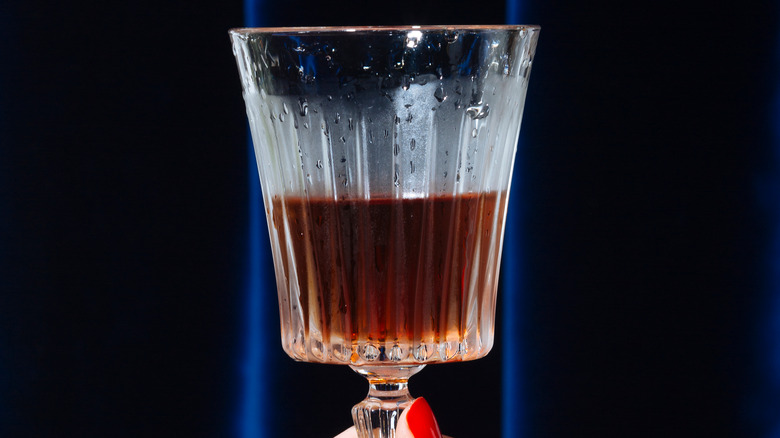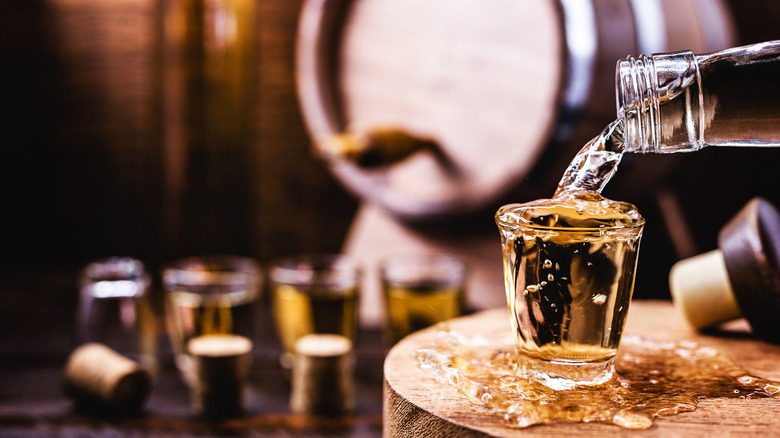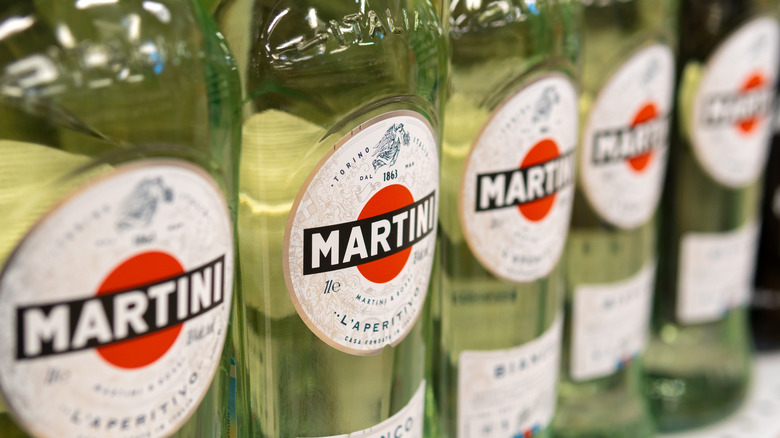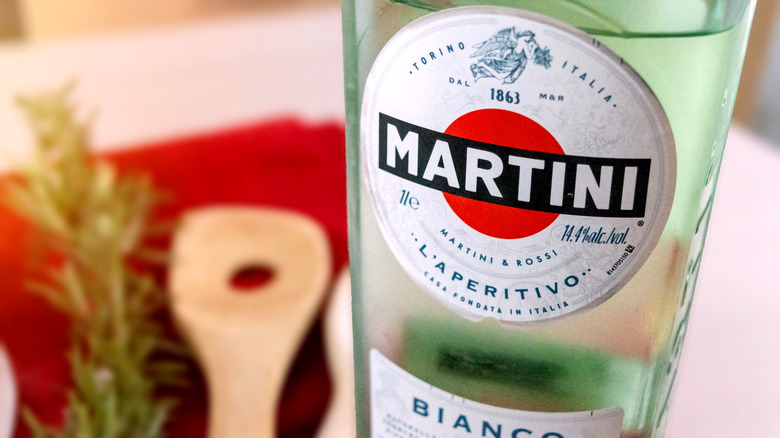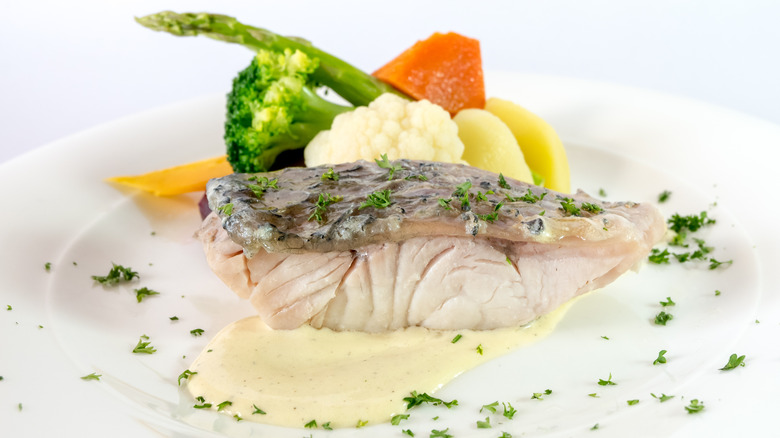What Is Vermouth And What Does It Taste Like?
If you're a cocktail drinker or if you have made French onion soup before, you've probably heard of vermouth. For a lot of people, vermouth is an intriguing, passed-around word and remains an enigma of what it actually is or what it's used for. Perhaps the most widely known use of vermouth is in a classic martini, though its versatility varies widely.
Despite its origins in Italy, vermouth was initially used for medicinal purposes across Europe (though especially in Italy, France, and Germany). It originally contained wormwood, a health herb native to Europe, and the German spelling and French pronunciation of the word eventually led to the term "vermouth" (via Thrillist).
Though it no longer contains wormwood, vermouth has certainly become a popular ingredient—or occasionally even a neat sipper—over the years. Its use spans an abundance of cocktails and food recipes that call for a very unique flavor addition.
What does vermouth taste like?
Vermouth is often used in cocktails because of its sometimes-florally, sometimes-spiced taste profile. Because there are two types of vermouth, sweet and dry, the flavor profiles can definitely vary. If you're sniffing, sipping, or using dry vermouth, you can expect more floral, fruity, and herbed notes. These light and airy but non-overpowering flavors are why dry vermouth is the go-to for classic martinis—it adds a touch of its own flavor while enhancing that of the vodka or gin used in the cocktail (via The Spruce Eats).
Sweet vermouth, on the other hand, contains heartier notes of spices like vanilla, caramel, and darker fruits. It has a grander, fuller body of flavor than a typical dry vermouth. While it's probably not the best for a simple martini, sweet vermouth can add exceptional flavor to many types of cocktails. A Manhattan, for example, is a great use of sweet vermouth in a cocktail, as is a Negroni.
Is it a wine or a liquor?
Technically speaking, vermouth is a fortified wine. For those who don't quite know what a fortified wine is, it's basically a certain type of wine that's been "fortified" with a distilled liquor, especially brandy. So liquor is involved in some capacity!
The grapes for these wines are fermented and at some point during that fermentation process—depending on what style and flavor you're looking to create—the distilled liquor is added (via The Spruce Eats). The various notes of vermouth come from an infusion of herbs, spices, and other flavors to give it its unique taste.
Other fortified wines you've likely heard of include sherry, port, and Marsala, and many fortified wines typically serve as before- or after-dinner sippers. Vermouth does sometimes get confused for a liquor, especially given its particular ABV (usually 15-18%, per The Spruce Eats), but the key is that since it's not distilled, vermouth, therefore, can't be considered a liquor.
Which type of vermouth should you use?
The best way to tell which types of vermouth you like and how you want to use them is to taste a few and see which ones speak to you most. Aside from the differentiation between dry and sweet vermouth, there are also a ton of different substyles, flavors, and brands. Having a basis of what to expect and what it is you're looking for can help you figure out which ones to try first.
But before you start opening up a bunch of vermouth bottles, know that it is used much more commonly as an additive in cocktails and sometimes food recipes than it is as its own sipper. Sometimes, however, you can enjoy a bit of vermouth in a glass over ice, which is an easy way to really get to know its taste.
Bon Appétit mentions a few of the herbs you might taste when sipping vermouth, like saffron and juniper, as well as a few key differences among dry white, sweet red, and sweet white vermouth. And, since everyone's tastes are different, you might enjoy vermouth much more than someone else; this article by Bon Appétit also includes a fun diagram of celebrity vermouth-to-martini ratios, to give you an idea.
What's the difference between sweet vermouth and dry vermouth?
The main difference between sweet vermouth and dry vermouth is, of course, the taste profiles. As mentioned, dry vermouth is going to have much lighter and more floral notes, while sweet vermouth has a bit heavier and more flavorful, sweeter notes (via The Spruce Eats).
There is also a noticeable difference in the coloring of both sweet and dry vermouth, though. Sweet vermouth is sometimes referred to as red vermouth, for its dark, coppery color. Dry vermouths are generally clear or pale yellow in color, which is why martinis retain their clear gin or vodka colorlessness, and why Manhattans and Negronis have that sultry, deep caramel color (via MyRecipes).
However, many types of sweet vermouth are now being made with a fortified white wine base as opposed to the traditional red wine base, which is what gives typical sweet vermouth its signature color. Sweet white vermouths very much resemble dry vermouths in color (via Thrillist).
Does vermouth need to be refrigerated?
Just like you'd want to refrigerate a nice, crisp white wine, you're going to want to refrigerate your vermouth. Thrillist keeps its warning simple, noting that not properly storing your vermouth can cause it to sour, thus ruining its flavor and usefulness.
According to Bon Appetit, vermouth will begin oxidizing after a month or so, which is why you want to keep it refrigerated. After that, you've got another good one-to-two months before you won't want to use it anymore. A piece from GQ suggests trying to use it all within three months of opening if you can.
Also, you don't necessarily need to buy large bottles of vermouth if you know you're not going to use all of it. Half bottles are usually readily available and make more sense if you're not a frequent user of the fortified wine. But, GQ does make an additional and valid point: the better the vermouth, the more likely (and sooner) you'll use all of it!
The history of vermouth
As mentioned, vermouth (at least, the vermouth you're familiar with today) originated in Italy. According to Dry Martini, this "modern vermouth" was created in 1786 by Antonio and Beneditto Carpano — an updated take on a concoction with potentially very old roots. The outlet shares it is thought that a rudimental version of the fortified wine dates back to ancient Greek times with Hippocrates himself as the initial creator. The famous phsycician combined wormwood with wine and a few different spices, resulting in what was then called "Hippocratical."
Even with solid confidence in its Greek and Italian origins, the true geographical belonging of vermouth is very much up for debate. France firmly asserts its ownership of the fortified wine as well, particularly the white and dry varieties, according to Thrillist. The outlet points out that, as production of red vermouth expanded, the drink made its way into the hands of the French, who then began producing their own style of vermouths.
Other ways to use vermouth
You've already got an idea of what vermouth actually is, how it will taste, and how it is often drank: at the base of a gin martini, stirred in a Negroni, or neat in a glass, sure. But is that really where the fortified wine possibilities end?
While we did mention French onion soup earlier, vermouth can be a flavorful cooking tool. Dry vermouth is a great substitute for white wine in virtually any recipe that calls for it — from poaching fish or braising meat to even just deglazing pans. The ingredient has substantially more aroma and flavor than your standard white wine, so it can add a richer and more complex profile to whatever you're cooking. Sweet red vermouth will natrually pair better with sweet recipes that call for red wine. (This is also a really great way to use up any leftover or improperly stored vermouth so you don't waste any of the good stuff!)
Vermouth vs. sherry
Vermouth is often — and understandably — likened to sherry, as the two share similar traits and qualities. For one thing, sherry is also a fortified wine; the intense aroma and flavor that vermouth is known for is quite similar to that of sherry. In fact, the two are so easily interchanged Serious Eats encourages swapping the traditional martini ingredient for sherry (though the outlet notes sherry is more savory and a bit more subtle than vermouth).
Often conflated, there is a key difference between vermouth and sherry that you should know if you're trying to decide between the two. While vermouth's unique flavors and aromas are generally the result of added botanicals and spices, sherry relies on its own fermentation and aging process to deliver its flavor. Wine Spectator further differentiates the two fortified wines using the same logic, adding that vermouth has a more "medicinal quality" thanks to those flavoring agents.
Both fortified wines are made in a variety or styles: from sweet to dry and in a range of colors.

